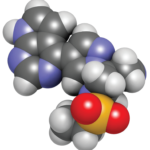 ACR CONVERGENCE 2022—In early 2022, Ytterberg et al. published findings from the phase 3b/4 ORAL-Surveillance safety study (NCT02092467), comparing tofacitinib, a Janus kinase (JAK) inhibitor with adalimumab and etanercept, tumor necrosis factor (TNF) inhibitors, in patients with rheumatoid arthritis (RA). The study assessed the risk of major adverse cardiac events (MACE) and cancer, demonstrating that patients with RA who were treated with tofacitinib had a higher risk of developing MACE and cancer than patients treated with TNF inhibitors.1,2 Subsequently, the U.S. Food & Drug Administration added a boxed warning to tofacitinib’s label.3
ACR CONVERGENCE 2022—In early 2022, Ytterberg et al. published findings from the phase 3b/4 ORAL-Surveillance safety study (NCT02092467), comparing tofacitinib, a Janus kinase (JAK) inhibitor with adalimumab and etanercept, tumor necrosis factor (TNF) inhibitors, in patients with rheumatoid arthritis (RA). The study assessed the risk of major adverse cardiac events (MACE) and cancer, demonstrating that patients with RA who were treated with tofacitinib had a higher risk of developing MACE and cancer than patients treated with TNF inhibitors.1,2 Subsequently, the U.S. Food & Drug Administration added a boxed warning to tofacitinib’s label.3
Limited comparative safety data exist between non-TNF inhibitor, biologic disease-modifying anti-rheumatic drugs (bDMARDs) and JAK inhibitors other than tofacitinib. Therefore, Chicre et al. sought to study the risk of MACE as a primary outcome and all-cause death as a secondary outcome in patients with RA treated with a bDMARD (tocilizumab) or JAK inhibitor. Co-author Alisson Pugliessi MD, Departamento de Ortopedia, Reumatologia E Traumatologia da Faculdade de Ciências Médicas da Universidade Estadual de Campinas (UNICAMP), Cidade Universitária, Campinas, SP, Brazil, presented the findings during ACR Convergence 2022.4
Methods: The authors performed a systematic review within six medical databases through June 1, 2022. The review included randomized controlled studies that were in phase 2–4 and evaluated patients with RA who were treated with JAK inhibitors (i.e., tofacitinib, baricitinib or upadacitinib) or tocilizumab compared with control patients who were treated with TNF inhibitors or placebo. Three investigators independently assessed the study data. A network meta-analysis with additive and random effects to evaluate the risk of MACE and all-cause death compared with TNFi was completed. The authors calculated the posterior probability of increasing the primary and secondary outcomes following Bayes’ theorem.
The Results
The meta-analysis included 19 randomized, controlled clinical trials, encompassing 19,074 patients and 54,713 patient-years. Tocilizumab and JAK inhibitors were linked to non-statistically significant increases in the risk of MACE when compared with TNF inhibitors (odds ratio [OR] 1.0669 [95% CI 0.7896; 1.4414; P=0.673] and 1.2712 [0.8970; 1.8014; P=0.177], respectively [I2=0%]). The posterior probabilities of increasing MACE by at least 15% were 21% and 83%. Tocilizumab and JAK inhibitors were also linked to non-statistically significant increases in the risk of all-cause death compared with TNF inhibitors (OR of 1.3526 [0.6283; 2.9117; P=0.44] and 1.2044 [0.5611; 2.5852; P=0.633], respectively [I2=9%]). The posterior probabilities of increasing all-cause death by at least 15% were 81% and 61%.
Conclusion
In this meta-analysis, the authors found a substantial probability—greater than 60%—that JAK inhibitors increase the risk of MACE and all-cause death compared with TNF inhibitors and bDMARDs. Additionally, tocilizumab was found to increase the risk of all-cause death compared with TNF inhibitors. These results emphasize the need for new and more safety studies comparing JAK inhibitors, TNF inhibitors and non-TNF inhibitor bDMARDs.



